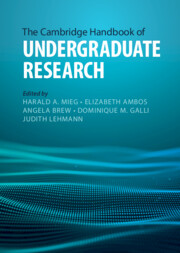Book contents
- The Cambridge Handbook of Undergraduate Research
- The Cambridge Handbook of Undergraduate Research
- Copyright page
- Contents
- Figures
- Tables
- Contributors
- Foreword
- Foreword
- 1 Introduction
- Part I Theory and Research on Undergraduate Research
- Part II Implementation, Approaches, Methods
- Part III Disciplines
- 17 Introduction
- Part III.1 STEM
- Part III.2 Health
- Part III.3 Social Sciences
- Part III.4 Humanities
- 32 Undergraduate Research in History
- 33 Undergraduate Research in English
- 34 Undergraduate Research in Philosophy
- 35 Undergraduate Research in Theology and Religious Studies
- Part III.5 Arts & Design
- Part III.6 Disciplines A–Z
- Part IV International Perspective
- Part V Avenues for Developing Undergraduate Research
- Index
- References
33 - Undergraduate Research in English
from Part III.4 - Humanities
Published online by Cambridge University Press: 11 August 2022
- The Cambridge Handbook of Undergraduate Research
- The Cambridge Handbook of Undergraduate Research
- Copyright page
- Contents
- Figures
- Tables
- Contributors
- Foreword
- Foreword
- 1 Introduction
- Part I Theory and Research on Undergraduate Research
- Part II Implementation, Approaches, Methods
- Part III Disciplines
- 17 Introduction
- Part III.1 STEM
- Part III.2 Health
- Part III.3 Social Sciences
- Part III.4 Humanities
- 32 Undergraduate Research in History
- 33 Undergraduate Research in English
- 34 Undergraduate Research in Philosophy
- 35 Undergraduate Research in Theology and Religious Studies
- Part III.5 Arts & Design
- Part III.6 Disciplines A–Z
- Part IV International Perspective
- Part V Avenues for Developing Undergraduate Research
- Index
- References
Summary
English as a university subject covers a very wide range of topics, with variation around the world both in scope and in how programmes are organized. Work in English is often more or less formally divided into sub-disciplines. In the UK, language, literature, and creative writing are the three most common subdivisions. In Europe, different divisions are made and students on English programmes often look at two or more of these areas. In the USA, divisions are stronger, with very little work in universities that combines or connects linguistic and literary perspectives. This chapter focuses on undergraduate research on language, literature and creative writing, without presupposing that this encompasses all that can be covered by English or that these areas should be sharply distinguished. It highlights higher education in the UK, partly because there is little data on international practice and anecdotal evidence often relates to particular institutions.
Keywords
- Type
- Chapter
- Information
- The Cambridge Handbook of Undergraduate Research , pp. 321 - 328Publisher: Cambridge University PressPrint publication year: 2022
References
- 1
- Cited by

